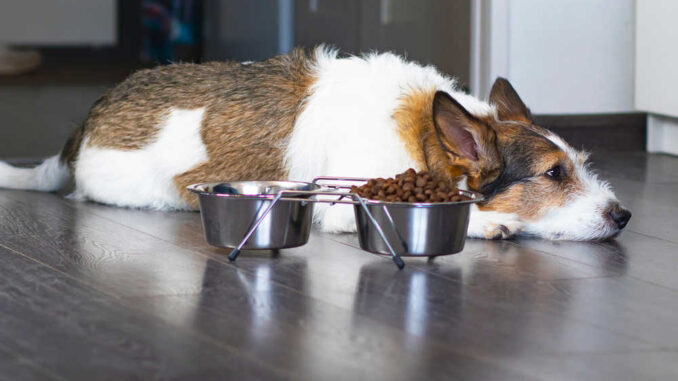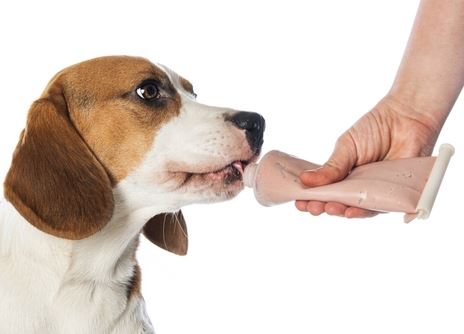
This article was updated on June 3rd, 2023
Sometimes I get a call from an owner asking: “Doc, my dog won’t eat anything. What should I do?” I explain there are various reasons for dogs to lose their appetite and recommend they bring their furbaby in for an examination. If your dog stops eating, it may be something as simple as a sore tooth, or it could be an indicator of a serious illness. The best way to determine the cause is by scheduling an appointment with your veterinarian.
In this article, we’ll look at common causes of anorexia in dogs and what you and your vet can do about it. We’ll also describe the signs and circumstances under which euthanasia may be the most humane option.
What does it mean when sick dogs stop eating?
If you have a sick dog that stops eating, he may be experiencing an upset stomach and have no desire to eat. However, it could be a sign that his illness is serious or in its final stages.
You should take your sick dog to the vet when he won’t eat if:
- He also has vomiting & diarrhea
- His appetite does not return in 1-2 days
- He’s already being treated for a severe health condition
What are the top reasons that cause my dog to stop eating, and how can my veterinarian help?
There are several reasons that sick dogs lose interest in their food.
Mild conditions
When dogs feel under the weather, they may stop eating for a few days. Examples of mild conditions include:
- A cold-like virus
- Mild, self-limiting infection
- Dental pain
- Recent vaccinations
In these cases, you can monitor your dog to see if his appetite returns. If you have any concerns, contact your veterinarian. The doctor may recommend an appetite stimulant or switching food to encourage your dog to start eating.
Emotional and behavioral issues
Your dog may also stop eating due to emotional or behavioral issues such as:
- His routine changed
- Stress from fireworks, thunderstorms, or other loud noises
- Separation anxiety
- Recent travel
- Intimidation from another pet
When the cause is stress-related, dogs usually start eating again once the stimulus is gone or adjust to the changes. This generally takes a few days. If your dog is prone to bouts of anxiety, he may need behavioral modification training.
Food-related
The food your dog ingests can affect his appetite. Your pooch may lose interest in eating when:
- He has too many treats
- He eats table scraps that upset his stomach
- He eats a dead animal or spoiled food that’s on the ground
- He doesn’t like the new food you’re giving to him
Food-related anorexia may or may not include vomiting. If the symptoms are mild, you can try fasting your pup for 1-2 meals. If your dog appears nauseous, put him on a bland diet like boiled rice and lean chicken for a few days to rest the digestive tract. When dogs refuse a new formula, you may need to switch the food to something more palatable.
Severe illness
Your dog may have a severe illness when his loss of appetite includes other symptoms like
- Excessive drooling
- Severe vomiting/diarrhea
- Lethargy or depression
- Abdominal pain
- Fever
If you notice these or other concerning symptoms in addition to sudden anorexia, you should contact your veterinarian. Your dog may have a life-threatening condition like pancreatitis, intestinal blockage, or a severe infection like parvovirus.
Your veterinarian will examine your pooch and run diagnostic tests to determine the underlying cause of his symptoms. Once he has a diagnosis, the doctor will recommend treatment. Fortunately, many severe conditions are treatable and have a good prognosis when caught early. However, some diseases, such as cancer or congestive heart failure, are terminal.
End stage of a terminal disease
Dogs suffering from a terminal disease such as cancer may stop eating for various reasons, including
- Medication side effects
- Pain from the disease
- The tumor is blocking the digestive tract
- Your dog feels too sick to eat
At this point in your dog’s life, you should have an honest conversation with your veterinarian to determine whether treatment can help to improve your beloved furbaby’s quality of life and extend his days. If you decide to pursue further treatment, your vet may be able to help your dog get the nutrition he needs by:
- Changing your dog to a more palatable prescription diet for his condition
- Prescribing antinausea medications that don’t interfere with treatments
- Adjusting medications to reduce the effects of the disease
- Giving your dog an appetite stimulant to encourage eating
- Switching to syringe feeding with a liquid diet
- Inserting a feeding tube and feeding a liquid diet
What other factors should I consider before I euthanize my dog?
If your dog has a severe or terminal disease and stops eating, consider the following before you elect to euthanize him.
- Are there treatments that can prolong your dog’s life?
- What is the short-term and long-term prognosis?
- How will the treatments affect your dog’s quality of life?
- What is the cost of treatment?
- Are there other signs my dog isn’t doing well?
- Difficulty breathing
- Frequent accidents
- Not drinking
- Loss of mobility
- Seizures or confusion
- Whining or howling in pain
Our quiz about dog euthanasia helps you understand all these factors to evaluate when is the right to put your dog to sleep.
How you can help your dog get the nutrients he needs
Older dogs or pups suffering from a chronic condition sometimes lose interest in food. However, they still need to take in calories and nutrients to live. If your ailing dog refuses to eat, there may be ways to make stimulate his appetite or make his food more palatable:
- If you feed dry food, add water or sodium-free broth to the kibble to soften it
- Switch to canned or wet food
- Warm your dog’s wet food serving in the microwave – check it to make sure it’s not too hot before you feed it to your pooch
- Add a savory meal topper such as a commercial product, some boiled hamburger, or skinless, cooked chicken breast
- Add a probiotic to the food that’s palatable and aids digestion
- Try feeding some meat-based baby food as long as it doesn’t contain garlic or onion-based ingredients
If your dog continues to refuse food or isn’t getting enough nutrition, talk to your veterinarian about:
- Giving your dog a nutrient paste to provide nutrients and calories

- Using a syringe to feed a liquid recuperation diet. See listing below:
- Help your dog BOUNCE BACK
- Prescribing an appetite stimulant like Mirtazapine
- Prescribing anit-nausea medication like maropitant
- Putting in a feeding tube to administer liquid nutrition. See listing below:
- HIGH-CALORIE WEIGHT GAINER for DOGS and CATS - Miracle Vet dog high-calorie weight gain multivitamin supplement is packed with calories and essential vitamins, and minerals to support overall pet health and formulated especially for multiple purposes, including senior dog supplements, dog prenatal vitamins, and dog electrolytes
For more tips, read our article with 9 Tips to Get Your Senior Dogs To Eat More.
When is euthanasia the most humane option for a dog that won’t eat?
Our dogs are beloved family members, so euthanasia is never an easy decision. Fortunately, your veterinarian can walk with you in the process and help you identify the signs that it’s time to say goodbye. As you discuss your options with the doctor, consider the following:
- Has he stopped eating or drinking?
- Have there been changes in behavior such as lethargy or aggressiveness?
- Are there symptoms of pain like whining, limping, panting, or sleeping a lot?
- Has he lost mobility?
- Is he having continence issues/frequent accidents?
- Does he seem to be depressed or lethargic?
- Are there more bad days than good days?
- Has his quality of life declined?
- Is there a treatment available that can prolong his life and maintain a good quality of life, and is it something you can manage personally and financially
If you answer yes to most of these questions, it may be more humane to put your dog down rather than prolong his suffering. Quiz: Is It Time to Euthanize My Dog? Answer 6 Questions.
The euthanasia process involves an injection of a medication that works like an anesthetic overdose. Your dog will slip peacefully into a deep sleep, then his heart and breathing will stop.
Disclaimer: This website's content is not a substitute for veterinary care. Always consult with your veterinarian for healthcare decisions. Read More.




Be the first to comment